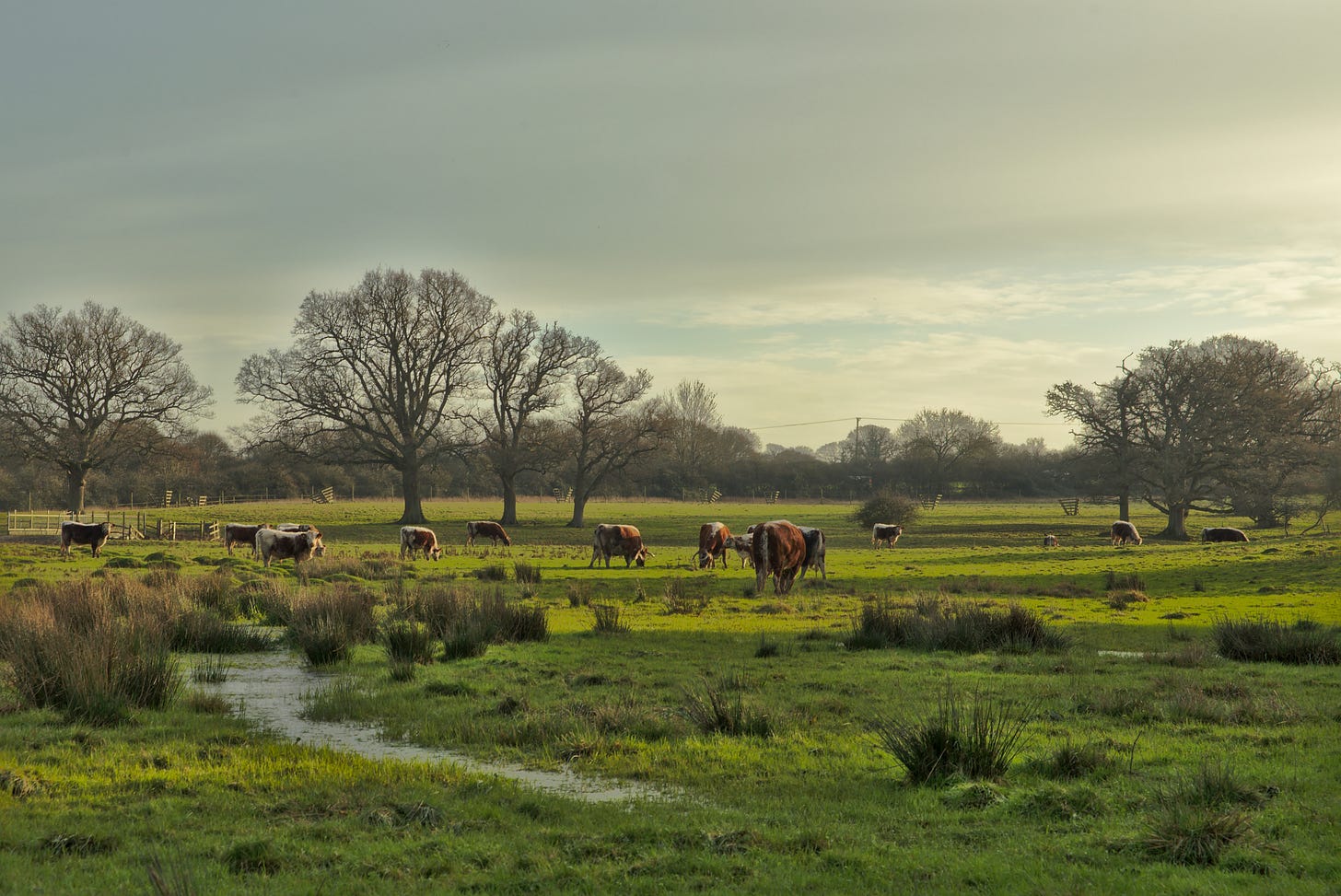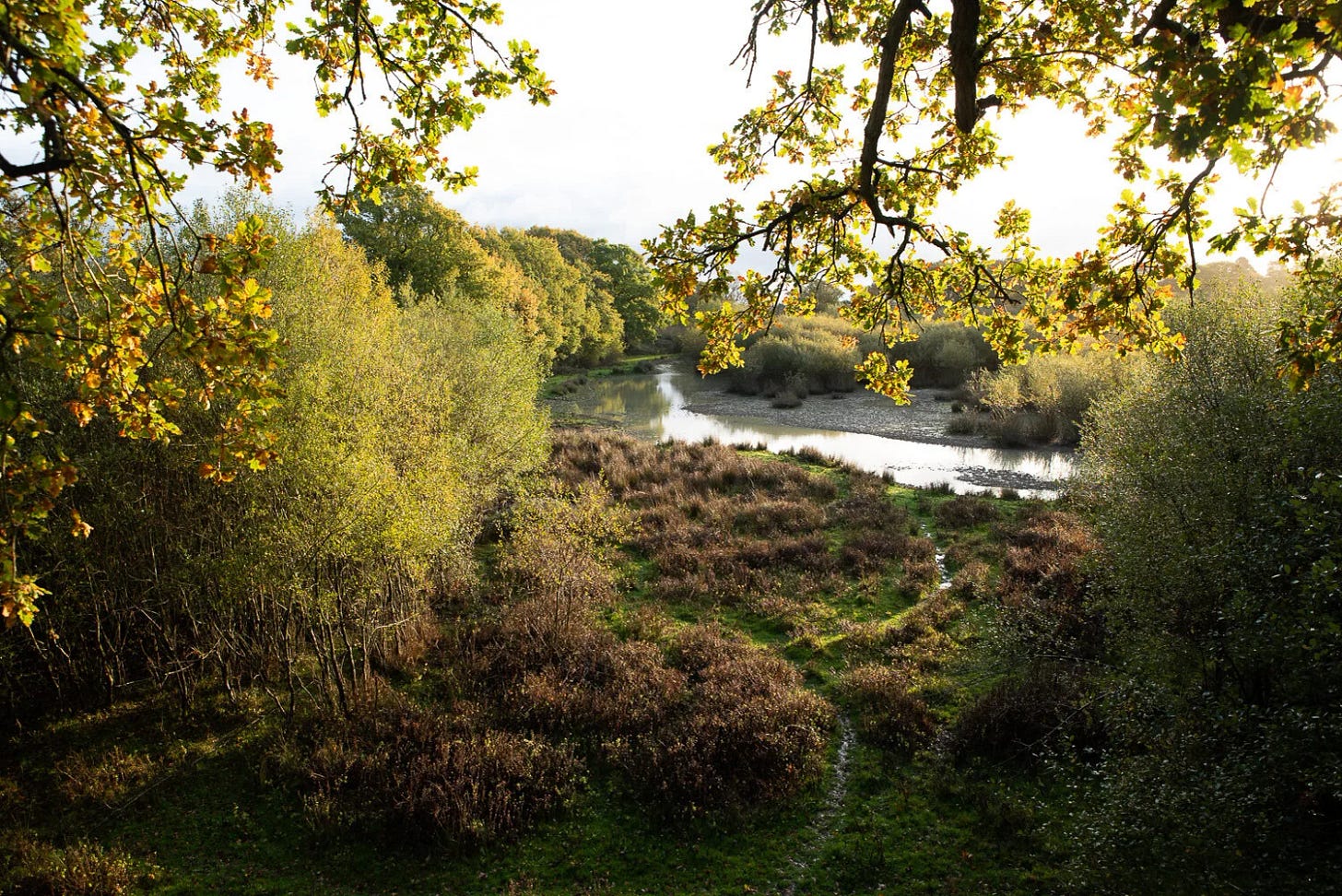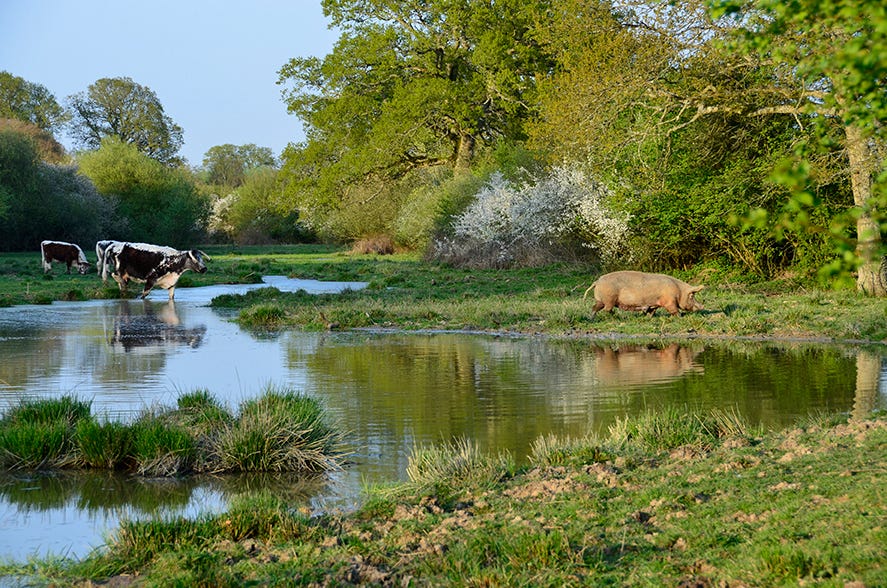Rewilding Will Not Feed Britain. Here Is What Might
Balancing wildlife recovery with the realities of feeding a nation
Rewilding has become one of the loudest ideas in British land use. From beavers in rivers to scrub and woodland returning on former grazing land, it is often presented as a bold answer to the nature and climate crises. For some, it is an exciting vision of a wilder countryside. For others, especially farmers, it raises uncomfortable questions about who our land is really for and what happens to food production when fields are taken out of use.
In the middle of this debate sit working farms that are already under pressure from rising costs, changing subsidies and shifting public expectations. Should UK farms go all in on rewilding, or is that the wrong question altogether.
In this piece I want to look at what rewilding actually means, why so many farmers feel threatened by it, how examples like the Knepp Estate are changing the conversation, and where I think our national priorities should really sit.
What Rewilding Looks Like in Practice
Rewilding is a word that gets used a lot, often as a kind of shorthand for fixing everything that has gone wrong with nature. In simple terms it means stepping back and allowing natural processes to shape the land again. That can look like reducing or removing grazing so scrub and woodland can return, rewetting drained peatlands so they hold water and store carbon, or bringing back species such as beavers that physically change the landscape through the way they live.
In the UK it is rarely about simply walking away from land. More often it is a shift along a spectrum. Fields that once grew cereals every year might move into wood pasture or rough grazing. Rivers that were straightened and dredged might be allowed to meander again. Some projects keep producing food but fit that production around wilder systems rather than trying to control every inch of land.
For many people, rewilding has become a symbol of hope. It offers a picture of birds and insects returning, wetlands buzzing with life, soils that can hold water in a drought and in a flood. The pro-rewilding argument is that healthier ecosystems mean more carbon stored in trees and soils, less flooding downstream, cleaner water, and in the long run a more stable base for food production. Some advocates say that with higher yields on the remaining farmland and changes in diet, we can afford to free up land for nature without threatening food supply.
That is the promise. The tension begins when you look at who lives and works on that land now.
Why Many Farmers Feel Threatened
When you listen to farmer perspectives on rewilding a pattern appears again and again. It is not that farmers are against nature. It is that they feel rewilding, as it is often talked about, lands on top of them rather than with them.
The Sustainable Food Trust describe rewilding as a buzzword that can feel like an attack on farmers who are already trying to produce food and look after wildlife at the same time. Academic work in the journal People and Nature finds that many farmers associate rewilding with land abandonment, loss of productive fields and a loss of control over how their land is used. There is a fear that policy will push them towards a future they have not chosen.
Food production sits at the heart of this. If good quality farmland is taken out of use in the UK, the food does not vanish. It is often imported from elsewhere, sometimes from regions with weaker environmental and welfare standards. Critics argue that this simply moves the environmental impact and the animal suffering overseas while allowing wealthy countries to feel greener on paper.
There is also the question of who wins and who loses. Reports from research groups such as TABLE, and essays on Resilience, point out that large estates, corporations and investors are often the ones who can afford to buy land, enrol in rewilding or carbon schemes, and market the story. Tenant farmers and small family farms can find themselves priced out or even losing tenancies if landlords decide that rewilding or carbon credits look more attractive than a working farm. Some call this a new kind of green land grab, where rural communities carry the cost while others collect the benefits.
On a human level, rewilding can feel like an erasure of identity. Farming is not just a land use. It is a culture, a set of skills, a relationship with animals and landscapes built over generations. When rewilding is presented as the opposite of farming, it can sound as though those skills and that care for the land no longer matter. That is why you hear such strong language about the right to farm and the right to plant in some of the more critical writing.
If you want to feel the human cost behind this debate, Carrie Starbuck’s piece on Substack, Rewilding’s Human Cost, is a powerful read. She writes about who gets left behind when land is taken out of food production in the name of nature recovery. Tenant farmers, smallholders, rural workers. People whose lives are bound up with the land but who do not own it. Her argument, and one I share, is not that rewilding is always wrong. It is that rewilding without a serious conversation about food security, land ownership and rural livelihoods risks deepening existing inequalities.
A Case Study at Knepp
If you follow rewilding in the UK, you have probably heard of Knepp in West Sussex. It is often held up as the flagship example of what happens when you step back and let natural processes lead. Once a conventional arable and dairy farm that struggled to turn a profit, the estate shifted towards a large rewilding project of around three thousand five hundred acres. Today it is known for free roaming herbivores, wood pasture, wetland restoration and an impressive list of wildlife successes.
What interests me about Knepp is that it has not walked away from food production altogether. Instead it has reframed it. The estate now sells what it calls wild range meat from animals that are part of the grazing ecology of the rewilded landscape. There is an online butchery, a market garden, a restaurant and a busy calendar of safaris, walks and events. It is a rewilding project that still sees itself as part of a food system and a rural economy, not just a nature reserve.
At the same time I find myself asking some uncomfortable questions. How much food is actually being produced. Is it enough to supply the restaurant and campsite. Enough to feed the local area. Or the kind of volume that would make a real dent in feeding a nation. None of this takes away from the importance of what Knepp has achieved for wildlife and for public awareness. Projects like this are vital test beds. They show us what is possible when we give nature more space and when we think differently about grazing animals.
But I do not believe that a handful of large rewilding estates, however inspiring, can be the main answer to food security. Rewilding will not feed Britain on its own. For me the bigger and more urgent task is to support the farmers who are already producing most of our food to transition towards nature friendly systems. We need fields that still grow crops and support livestock, but that also restore biodiversity, rebuild soil health and cut emissions. That is where the real scale sits.
Why I Think Agroecology Should be the Priority
As a nation I believe the UK needs to move much more decisively towards agroecology. By that I mean farming systems that work with ecological processes rather than against them. Mixed farms with rotations that include legumes and cover crops. Livestock integrated into grass and crop systems rather than kept in intensive units. Trees and hedges and ponds stitched back into the landscape so that wildlife has space within working farmland, not only in separate reserves.
Right now our commercial food production is dominated by systems that are highly intensive and heavily reliant on imported feed, fertiliser and agrochemicals. Small scale and nature friendly farming exists, but it sits at the edges. That balance needs to change. If we want to keep feeding ourselves while restoring nature, we cannot rely on a small number of flagship rewilding projects while the bulk of our food still comes from extractive systems.
This is where I see the real opportunity.
Imagine if the same level of political attention, public funding and media excitement that currently gathers around rewilding estates was directed towards helping ordinary farmers shift to agroecological methods. Imagine if every county had its own version of Knepp in miniature, not as a separate estate, but spread across hundreds of farms that still produce milk, meat, grains and vegetables.
Rewilding can and should be part of this picture. There will be places where allowing land to go wilder makes sense, for flood management, for carbon, for species that need large undisturbed areas. But it should sit alongside, not above, farmer led nature recovery on working land.
You know I am not interested in simple slogans on this. I want to hear your honest view.
Rewilding alone will not feed Britain. So I am curious where you think our land use priorities should really sit.
If you are a farmer or work in the food system, I would love to know:
What changes you have already made for wildlife on your land?
What support you would need to make more space for nature while still producing food?
Whether you feel current policies are pushing too hard towards rewilding or not hard enough?
Whether you think agroecology and nature friendly farming are getting the attention they deserve?
Please add your voice. I will be reading everything and may share a follow up piece pulling together your perspectives and some of the best ideas for farmer centred nature recovery.
If just 5% of my readers tipped £1/$1 this essay would pay for itself in terms of time spent working on it.







This is a wonderful, well written, thoughtful article. I hope someone in a position to make positive change in support of Britain’s farming community reads it as well.
Quite right Helen. Rewilding arable land will not help with food supply. You and I are strong believers of regenerative farming methods - that is the answer.
Here in Worthing, a Labour run council, rewilding is a virtuous policy. The traffic islands are full of weeds, no flowers mind you. The roadside is too. I have written to the council to offer to sew wild seed instead of weeds but they're not interested - in the too hard box.
Here in West Sussex, we have plenty of housing estates being built which, while we need affordable homes, (500k average here unless it's a flat), it seems counterintuitive in the wider 'environment protection' issue. More houses, more cars, more people, more water needed etc.
Typical pen pusher plans - never talk to anyone who 'knows'. Lateral thinking totally absent.